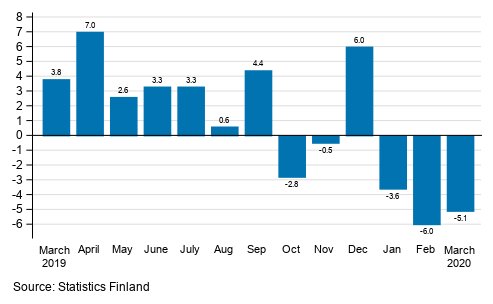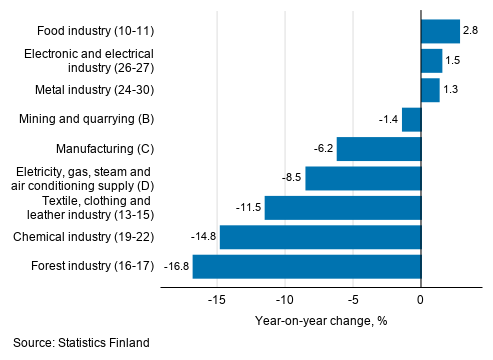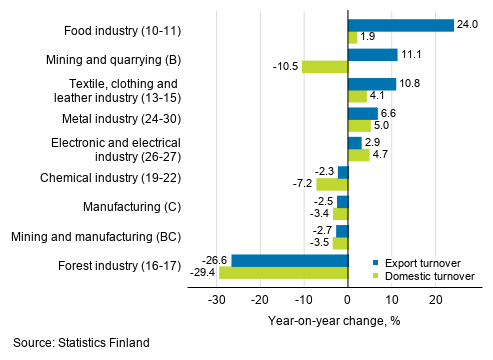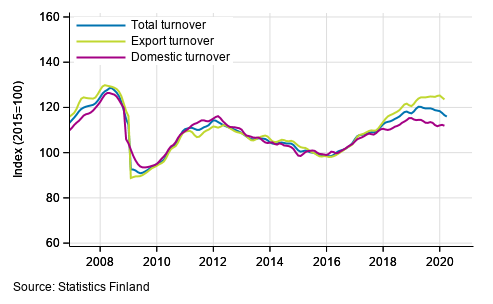Published: 15 May 2020
Turnover in industry decreased by 5.1 per cent in March
According to Statistics Finland, working day adjusted turnover in industry (TOL BCD) decreased in March by 5.1 per cent year-on-year. Of the main industries, turnover declined most in the forest industry, by 16.8 per cent from one year earlier. Seasonally adjusted turnover in industry (TOL BCD) grew by 0.4 per cent compared with February.
Annual change in working day adjusted turnover in manufacturing (BCD), % (TOL 2008)

After the forest industry, turnover decreased most in the chemical industry, where it was 14.8 per cent lower than one year earlier. Within the chemical industry, the turnover of the industries developed in different ways. As a result of the corona epidemic, turnover grew in the pharmaceutical industry, while the fall in the price of oil had a decreasing effect on the turnover of the entire chemical industry. In the index of turnover in industry, data are collected on the enterprise level, so data are not available on the product level. The turnover of the textile, clothing and leather industry decreased by 11.5 per cent and that of electricity, gas, steam and air conditioning supply by 8.5 per cent. Turnover grew in three main industries, most in the food industry, where it was 2.8 per cent higher than in March twelve months earlier.
Annual change in working day adjusted turnover in manufacturing by industry, March 2020, % (TOL 2008)

Industrial actions affected the export turnover and domestic turnover of the forest industry in February
Export turnover adjusted for working days decreased in February most in the forest industry, by 26.6 per cent from one year ago. In the chemical industry, export turnover declined by 2.3 per cent. In contrast, export turnover grew most in the food industry, where it was 24.0 per cent up on February of the year before. In mining and quarrying, export turnover grew by 11.1 per cent and in the textile, clothing and leather industry by 10.8 per cent from the previous year. Export turnover was also growing in the metal industry as well as in the electrical and electronics industry.
Annual change in working day adjusted export turnover and domestic turnover in manufacturing by industry, February 2020, % (TOL 2008)

Domestic turnover in the forest industry decreased by 29.4 per cent from one year back. Domestic turnover decreased by 10.5 per cent in mining and quarrying and by 7.2 per cent in the chemical industry. Domestic turnover grew in February most in the metal industry, by 5.0 per cent, and in the electrical and electronics industry, by 4.7 per cent from one year back.
Trend series of turnover, export turnover and domestic turnover in manufacturing (BC), January 2007 to February-March 2020, % (TOL 2008)

The index of turnover in industry describes enterprises whose main industry is manufacturing. The calculation of the indices is based on the Tax Administration’s self-assessed tax data which are supplemented with data obtained with Statistics Finland’s sales inquiry. The monthly turnovers of manufacturing enterprises can vary considerably, especially in the metal industries. The variation is mainly due to invoicing practices. The final invoice for major machinery deliveries and projects may be recorded in the sales of one month, even if the delivery had required the work of several months or years.
The factors caused by the variation in the number of weekdays are taken into account in adjustment for working days. This means taking into consideration the lengths of months, different weekdays and holidays. In addition, seasonal variation is eliminated from seasonally adjusted series, on account of which it makes sense to compare observations of two successive months as well.
In terms of turnover, data for the latest month are preliminary and are released at a delay of around six weeks. The data may become significantly revised particularly on more detailed industry levels in coming months. Export turnover and domestic turnover are, for the time being, still released at a delay of two and a half months.
Source: Index of turnover in industry 2020, March, Statistics Finland
Inquiries: Maija Sappinen 029 551 3348, Heli Suonio 029 551 2481, myynti.teollisuus@stat.fi
Director in charge: Mari Ylä-Jarkko
Publication in pdf-format (342.4 kB)
- Tables
-
Tables in databases
Pick the data you need into tables, view the data as graphs, or download the data for your use.
Appendix tables
- Figures
- Revisions in these statistics
-
- Revisions in these statistics (15.5.2020)
Updated 15.5.2020
Official Statistics of Finland (OSF):
Index of turnover in industry [e-publication].
ISSN=1798-596X. March 2020. Helsinki: Statistics Finland [referred: 19.1.2025].
Access method: http://www.stat.fi/til/tlv/2020/03/tlv_2020_03_2020-05-15_tie_001_en.html

